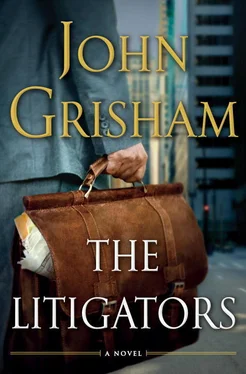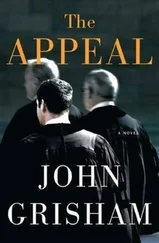She listened without taking notes. When he finished, she said, “Indeed, that’s pretty simple, and not altogether original. Why Chicago?”
“The judge. Harry Seawright. We’ve researched every judge in every Krayoxx case filed so far, and we think Seawright is our man. He’s shown little patience for mass torts. He despises frivolous lawsuits and junk filings. He uses his Rocket Docket to ram cases through discovery and get them to trial. He refuses to allow cases to gather dust. His favorite nephew uses Krayoxx. And, most important, his close friend is former U.S. senator Paxson, who now has an office on, I believe, the eighty-third floor here at Rogan Rothberg.”
“Are you suggesting we could somehow influence a federal judge?” she asked, with her left eyebrow slightly arched.
“Of course not,” Walker said with a nasty grin.
“What’s the complicated part of your plan?”
“Deception. We create the impression that we intend to settle the Krayoxx cases. We’ve been down this road before, believe me, so we know quite a lot about mass settlements. We understand the greed of the tort bar, and it is enormous beyond imagination. Once they believe that billions are about to hit the table, the frenzy will get much worse. With a settlement looming, the preparation for a major trial will become less important. Why bother to prepare when the cases are about to settle? We — you — on the other hand, are working diligently to get ready for the trial. In our scheme, Judge Seawright will crack the whip, and the case will move along quickly. At the perfect moment, the settlement negotiations will collapse, the mass tort bar will be in chaos, and we’ll be staring at a trial date that Seawright will refuse to move.”
Nadine Karros was nodding, smiling, enjoying the scenario. “I’m sure you have a case in mind,” she said.
“Oh yes. There’s a local divorce lawyer named Wally Figg who filed the first Krayoxx case here in Chicago. Not much of a lawyer, three-man firm, nickel-and-dime stuff down on the Southwest Side. Almost zero trial experience, and absolutely none in the mass tort arena. Now he’s hooked up with a lawyer in Fort Lauderdale named Jerry Alisandros, a longtime nemesis whose goal in life is to sue Varrick at least once a year. Alisandros is a force.”
“Can he try a case?” Nadine asked, already thinking about the trial.
“His firm is Zell & Potter, and they have some competent trial lawyers, but they rarely go to trial. Their specialty is forcing companies to settle and raking in enormous fees. At this point, we have no idea who would show up here and actually handle the trial. They might bring in a local lawyer.”
To Walker’s left, Judy Beck cleared her throat and began, somewhat nervously, “Alisandros has already filed a motion to consolidate every Krayoxx case into an MDL, multi-district litigation, and—”
“We understand MDL,” Hotchkin broke in sharply.
“Of course. Alisandros has a favorite federal judge in southern Florida, and his MO is to create the MDL, get himself appointed to the plaintiff’s steering committee, then control the litigation. He, of course, receives extra compensation for being on the committee.”
Nick Walker took up the narrative. “Initially, we would resist all efforts to consolidate the cases. Our plan is to select one of Mr. Figg’s clients and convince Judge Seawright to assign it to his Rocket Docket.”
“What if the judge in Florida orders consolidation of all cases and wants them down there?” Hotchkin asked.
“Judge Seawright is a federal judge,” Walker said. “The case has been filed in his court. If he wants to try it here, no one, not even the Supreme Court, can order him to do otherwise.”
Nadine Karros was scanning a summary that had been passed around by the Varrick team. She said, “So, if I follow things, we select one of Mr. Figg’s dead clients, and we convince Judge Seawright to extract this case from the group. Then, assuming the judge goes along, we respond rather softly to the lawsuit, admit nothing, issue bland denials, take an easy approach to discovery because we don’t want to slow things down, take a few depositions, give them whatever documents they want, and sort of lead them down the primrose path until they wake up and realize they have a real trial on their hands. Meanwhile, you lull them into a false sense of security with the illusion of another jackpot.”
“That’s it,” Nick Walker said. “Exactly.”
They spent almost an hour discussing Mr. Figg’s dead clients — Chester Marino, Percy Klopeck, Wanda Grand, Frank Schmidt, and four others. As soon as the lawsuit was properly answered, Ms. Karros and her team would depose the legal representatives of the dead eight. Once they had the opportunity to observe and learn, they would make the decision about which one to isolate and push toward a trial.
The matter of young David Zinc was dealt with quickly. Though he had worked at Rogan Rothberg for five years, he was no longer employed there. No conflict of interest existed because at the time the firm did not represent Varrick, and Zinc did not represent the dead clients. Nadine Karros had never met him; indeed, only one associate on her side of the table could recall ever knowing who he was. Zinc had worked in international finance, a world away from litigation.
Zinc was now working in the world of street law and happy to be even further away from international finance. Very much on his mind these days was the Burmese housekeeper and her lead-poisoned grandson. He had a name, a phone number, and an address, but making contact had proved difficult. Toni, Helen’s friend, had suggested to the grandmother that the family consult a lawyer, but this had terrified the poor woman to the point of tears. She was emotionally spent, confused, and, for the moment, unapproachable. Her grandson remained on life support.
David had contemplated running the case by his two partners but quickly thought better of it. Wally might go charging into the hospital room and frighten someone to death. Oscar might insist on taking charge of the case and then want an extra percentage in the event of a settlement. As David was learning, his two partners did not split money equally and, according to Rochelle, fought over fees. Points were given for the lawyer who made initial contact, more for the lawyer who worked up the file, and so on. According to Rochelle, on almost every decent car wreck Oscar and Wally quibbled over the split.
David was at his desk drafting a simple will for a new client — typing it himself because Rochelle had informed him weeks earlier that three lawyers were far too many for one secretary — when his e-mail chimed with a note from the federal court clerk. He opened the e-mail and found an answer to their amended complaint. His eyes went straight to the attorney register, straight to the name of Nadine Karros of Rogan Rothberg, and he felt faint.
David had never met her, but he certainly knew her by reputation. She was famous throughout the entire Chicago bar. She tried and won the biggest cases of all. He had never uttered a recorded word in court. But there they were, names listed together as if they were equals. For the plaintiffs — Wallis T. Figg, B. Oscar Finley, David E. Zinc, of the firm of Finley & Figg, along with S. Jerry Alisandros of the firm of Zell & Potter. And for Varrick Laboratories, Nadine L. Karros and R. Luther Hotchkin of the firm of Rogan Rothberg. On paper, David looked as if he belonged in the game.
He read the answer slowly. The obvious facts were admitted; all liability was denied. Overall, it was a straightforward, almost benign response to a $100 million lawsuit, and it was not what they had anticipated. According to Wally, the first response from Varrick would be a vicious motion to dismiss, accompanied by a weighty brief prepared by bright Ivy Leaguers who toiled in the firm’s research department. The motion to dismiss would cause a significant skirmish, but they would prevail because such motions were rarely granted, according to Wally.
Читать дальше












